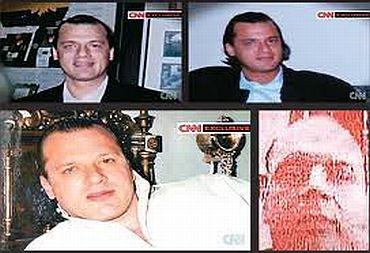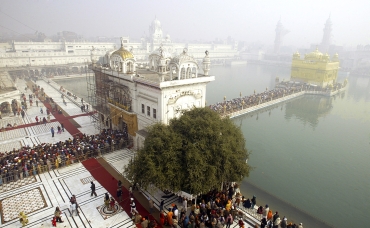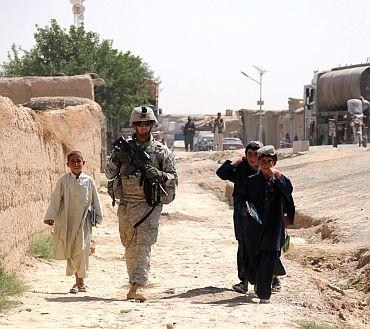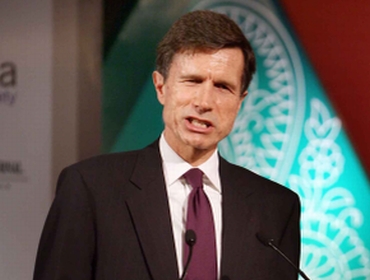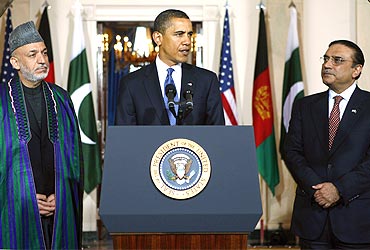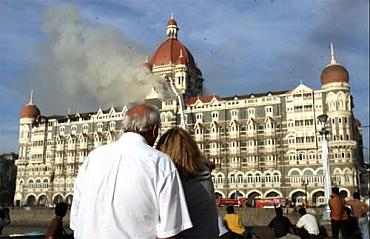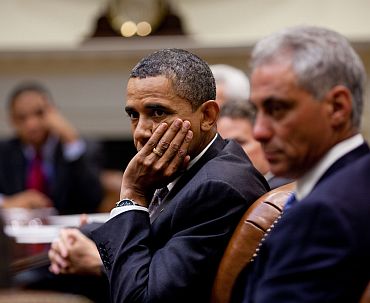 | « Back to article | Print this article |
Headley issue may spoil Obama's party in India
The Indian establishment may get a leverage while talking to American officials on bilateral efforts of counter-terrorism while the media splashes scary details about what Headley did in India, points out Sheela Bhatt
The controversy regarding United States President Barack Obama's no-show in Amritsar may die down but the recent revelations regarding Lashkar-e-Tayiba operative David Coleman Headley, who was arrested in Chicago last October, is already affecting the presidential visit.
After the revelation by Headley's wife that she had informed US intelligence agencies about her husband's LeT connections, it is becoming clearer that the Federal Bureau of Investigation was warned about possible terror attacks in Mumbai in advance.
America's double standard on counter-terrorism efforts is a bone of contention in the minds of the Indians.
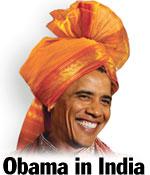 The Guardian newspaper has also published a damaging story, with details about Headley's interrogation, where he has claimed that Pakistan's Inter Services Intelligence supported him in planning and carrying out the Mumbai terror attacks. The Guardian claims that during the interrogation by Indian sleuths, Headley described dozens of meetings between officers of the ISI and top militants from the LeT, which was responsible for the 26/11 terror strike on Mumbai.
The Guardian newspaper has also published a damaging story, with details about Headley's interrogation, where he has claimed that Pakistan's Inter Services Intelligence supported him in planning and carrying out the Mumbai terror attacks. The Guardian claims that during the interrogation by Indian sleuths, Headley described dozens of meetings between officers of the ISI and top militants from the LeT, which was responsible for the 26/11 terror strike on Mumbai.
Headley conducted reconnaissance of 7, Race Course Road
Headley took money from the ISI and even conducted a reconnaissance of 7, Race Course Road, the residence of Prime Minister Manmohan Singh.
The build-up to President Obama's visit is not going smoothly at all, says a former Indian ambassador to the United States. He thinks, "If not handled well, it can turn directionless."
Even before the US president arrives in India, many hurdles have sprung up in his path, namely, the tricky issues related to nuclear liability, the Headley case, the visit to Amritsar, the H1B visa issue and outsourcing ban.
In India, National Security Advisor Shiv Shankar Menon, with help from Prime Minister's Office personnel including Pankaj Saran and Jaideep Sarkar, has been supervising the arrangements for the presidential visit. In Washington, DC, Menon's counterpart James Jones had been handling the visit till he resigned on October 8. Now his successor Tom Donilon has taken over. Some things are being looked after by Aneesh Chopra, federal chief technology officer. It seems that both sides are, still, looking for a focus issue.
'Big ticket event is not possible during Obama's visit'
Many experts feel that the visit is taking place at the wrong time because of the Congressional election in the US and Diwali festival in India. President Obama and his party are feeling the heat of the election. If Democrats face defeat in the elections, then a 'weaker' Obama would be arriving in Asia.
A former Indian ambassador to America said, "As far as I see, the big ticket event is not possible during Obama's visit due to circumstances in the region, as the Afghanistan situation is unpredictable. You may create headline news but the substance is unlikely to be added. The time is not appropriate."
He added that a combination of circumstances produces results in diplomacy.
"I don't see any confluence of Indian and American security interests due to the developments in Afghanistan and Pakistan and the delicate balance in US-China relations. The visit would be surely successful but the current strategic factors suggest that we have to take this visit in our stride. We should stop seeking big ticket events and move on to ensure that the bilateral relation does business as usual," he said.
'Planning stages for a large number of big-ticket items'
According to sources in New Delhi, deliberations are going on in Washington, DC, to showcase India and America's joint venture in IT to enhance the notions of democracy and open government around the world with the help of webcasting, broadcasting and various multimedia initiatives. However, these plans have not been finalised.
As late as October 13, Robert Blake, assistant secretary, south and central Asian affairs, said in his speech in Baltimore, "I know that what you would like is a detailed preview of the visit, which will mark his longest stay anywhere outside the US. But I don't want to scoop the president, and since we're still in the planning stages for a large number of big-ticket items, I don't want to jump the gun."
Blake was expectedly optimistic in his speech and emphasised that co-operation in education and agricultural collaboration will draw on resources in both countries to help sustain inclusive growth in India and the continued ascendance of India's poor into the middle-class, enlarging a market that benefits the world economy, and especially the US.
He also said, "McKinsey has predicted that India could have as many as 91 million middle class urban households in 2030, up from 22 million today. Each of these families will want a TV, internet service, washer and dryer, chapati maker, and anything that you or I have in or homes (not that I have a chapati maker), and the global economy, and especially the US, is set to produce and sell the goods and services for this growing middle class."
Pakistan is nervous
But American observers would surely notice that the middle class of India is provoked and disturbed to see the ongoing coverage of the Headley affair. It is now becoming clearer to the public that the FBI knew more about the Headley affair than they have been revealing to the Indian establishment. This perception needs to be addressed before and during Obama's visit.
According to Arvind Gupta, deputy chief of the Institute for Defence Studies and Analyses, "I think these revelations are very important. It is necessary that both sides come clean. It creates doubts in the minds of the Indian public about counter terrorism co-operation between the US and India."
It is also intriguing to see the timing of these revelations in the Guardian and the Indian media. It is confusing and full of riddles; who gains by the stunning revelations at this crucial time?
According to a British expert and author, there is hardly any doubt that Pakistan is nervous about Obama's forthcoming visit. Their focus is on the endgame in Afghanistan. They want to play a role in shaping a future government in Kabul that will look favourably towards Rawalpindi (Pakistan army's headquarters). Pakistan is alarmed now about NATO sponsored talks between the Taliban and Afghanistan President Hamid Karzai.
Headley's statement raises questions
The current high-level negotiations in Washington between Pakistan and the US is a pointer. The presence of Pakistan army chief Pervez Kayani to negotiate a huge financial package with American authorities shows that the Pakistan military is not living under the shadow of the civilian government.
There is no doubt that Headley's statement to the Indian interrogators is raising questions about the manner in which American intelligence agencies function. It is creating a credibility crisis in Indo-US relations. At the time of Obama's visit, it may seem like Pakistan has the advantage but it can be argued that the Indian establishment will get a leverage while talking to American officials on bilateral efforts of counter-terrorism and regional security, while the media is splashing scary details about what Headley did in India with the ISI's motivation.
According to the British journalist, "India gains by briefing against the ISI on the eve of Obama's visit by setting the public tone for talks."
Pakistan suffers the cancer of jihadi terrorism
He says, "It's also possible that the Republicans gain by reminding the president of the security agenda rather than the trade and cultural one, while piling the pressure on his administration to resolve the nightmare of Afghanistan and Pakistan."
However, the final word on the issue is yet to come. The undercurrents in the region are such that if the facts from the Headley affair are an embarrassment to the US, it says as much about Pakistan which, even as it suffers the cancer of jihadi terrorism, still supports horrifying attacks like the 26/11 terror strike in Mumbai.
President Obama's resolve to get out of Afghanistan, irrespective of what India thinks of the end game, will also play a role in his talk with Prime Minister Manmohan Singh, believes the British journalist.
